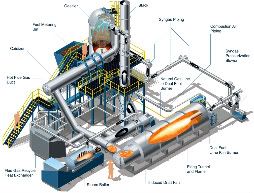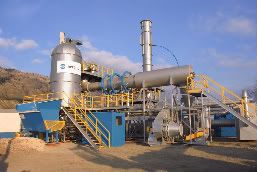Nexterra biomass gasification ready to displace up to 60% fossil fuels in lime kilns, 100% in boilers
 After two years of biomass gasification testing at the company’s product development centre in Kamloops, British Columbia, Nexterra Energy Corp. has confirmed that renewable synthesis gas, or “syngas”, produced by its gasifier has the ability to displace at least 60 per cent of fossil fuels used in lime kilns. Depending on the biomass feedstock and existing equipment configurations, 95 per cent substitution may be possible at many pulp mills, and up to 100 per cent in certain types of boilers.
After two years of biomass gasification testing at the company’s product development centre in Kamloops, British Columbia, Nexterra Energy Corp. has confirmed that renewable synthesis gas, or “syngas”, produced by its gasifier has the ability to displace at least 60 per cent of fossil fuels used in lime kilns. Depending on the biomass feedstock and existing equipment configurations, 95 per cent substitution may be possible at many pulp mills, and up to 100 per cent in certain types of boilers.The ability to convey syngas from where it is produced and combust it inside existing thermal process equipment could lead to dramatic cost and CO2 emissions reductions in a number of industries. The system could be used in multiple carbon-heavy industrial applications including pulp mill lime kilns, power boilers, rotary dryers and calciners commonly found in mineral processing, mining, cement and ethanol production industries.
Nexterra’s direct fire biomass gasification system is now ready for demonstration at commercial scale. Once proven at this scale, we plan a full commercial rollout for industries such as pulp and paper, wood products, mining and others that want to reduce operating costs while lowering their carbon footprint. Up to now, these customers were limited to using either natural gas or fuel oil. Syngas offers a cheaper, carbon-neutral and renewable fuel alternative. - Jonathan Rhone, Nexterra President and CEO
 Nexterra’s first generation gasification systems are close-coupled with heat exchangers to generate hot water, steam or hot air. The new direct fire application enables customers to decouple the process by producing syngas in one location and combusting it elsewhere on a site. The product development program included process simulation of end user equipment, as well as testing of specialized syngas conveying, pressurization and burner equipment at Nexterra’s test facility (images: the gasification plant with the firing tunnel and boiler that were used during the testing program, click to enlarge).
Nexterra’s first generation gasification systems are close-coupled with heat exchangers to generate hot water, steam or hot air. The new direct fire application enables customers to decouple the process by producing syngas in one location and combusting it elsewhere on a site. The product development program included process simulation of end user equipment, as well as testing of specialized syngas conveying, pressurization and burner equipment at Nexterra’s test facility (images: the gasification plant with the firing tunnel and boiler that were used during the testing program, click to enlarge).Nexterra’s technological breakthrough makes the switch from fossil fuels to syngas an attractive option for North America’s more than 100 kraft pulp mills and other industrial sites which face record high natural gas prices and, in British Columbia’s case, new carbon taxes:
 energy :: sustainability :: lime kilns :: pulp mills :: fossil fuels :: emissions :: fuel switching :: biomass :: bioenergy :: gasification :: syngas :: efficiency ::
energy :: sustainability :: lime kilns :: pulp mills :: fossil fuels :: emissions :: fuel switching :: biomass :: bioenergy :: gasification :: syngas :: efficiency :: Installation of a Nexterra direct fire gasification system at an average sized commercial pulp mill lime kiln, for example, has the potential to reduce natural gas consumption by more than 800,000 gigajoules (GJ) per year, the equivalent amount of natural gas needed to heat 5,000 residential homes. In addition, such a system could save a mill several million dollars annually and reduce greenhouse gas emissions by more than 25,000 tonnes per year.
The direct fire testing program was supported by Sustainable Development Technology Canada (SDTC), a not-for-profit foundation created by the Government of Canada, as well as by Canada’s National Research Council/IRAP Program, Natural Resources Canada and Ethanol BC.
Nexterra will present a paper on its direct fire program for lime kilns and boilers at the TAPPI 2008 Engineering, Pulping and Environmental Conference in Portland, OR, on August 27, 2008.
Nexterra Energy, based in Vancouver, BC, Canada, is a leading developer and supplier of advanced gasification systems that enable customers to self-generate clean, low cost heat and/or power using waste fuels "inside-the fence" at institutional and industrial facilities. Nexterra gasification systems provide a unique combination of attributes including design simplicity, reliability, versatility, ultra-low emissions, low cost and full automation to provide customers with a superior value proposition compared to conventional solutions.
SDTC is an arm’s-length foundation which has received $1.05 billion from the Government of Canada as part of its commitment to create a healthy environment and a high quality of life for all Canadians. SDTC operates two funds aimed at the development and demonstration of innovative technological solutions. The $550 million SD Tech Fund supports projects that address climate change, air quality, clean water, and clean soil. The $500 million NextGen Biofuels Fund supports the establishment of first-of-kind large demonstration-scale facilities for the production of next-generation renewable fuels. SDTC operates as a not-for-profit corporation and has been working with the public and private sector including industry, academia, non-governmental organizations (NGOs), the financial community and all levels of government to achieve this mandate.
The National Research Council Canada is recognized globally for research and innovation, and is a leader in the development of an innovative, knowledge-based economy for Canada through science and technology. The National Research Council Canada Industrial Research Assistance Program (NRC-IRAP) provides a range of both technical and business oriented advisory services along with potential financial support to growth-oriented Canadian small - and medium-sized enterprises. Working directly with these clients, NRC-IRAP supports innovative research and development and commercialization of new products and services. The program is delivered by a network of 260 professionals in 100 communities across the country. Funds provided under this program are done on a cost-share basis with their clients.
Natural Resources Canada (NRCan) puts innovative science and technology to work so Canada’s natural resources sector can continue to contribute to our quality of life, now and in the future. More information on the Government of Canada’s ecoENERGY Initiatives can be found here.
Ethanol BC is a non-profit R&D funding organization administered by FP Innovations. Grant funding now comes from a unique tax shifting mechanism established under regulation by the Provincial government. The program effectively allows forest companies operating bee-hive incinerators to pay a portion of their permit fees to Ethanol BC. These funds in turn are used to spur research and demonstration of new technologies that will ultimately utilize mill wood residues that are now being incinerated as wastes. The program has been in place since 2000 and is governed by a Board consisting of forest industry, provincial and federal government representatives.
 --------------
--------------
 Mongabay, a leading resource for news and perspectives on environmental and conservation issues related to the tropics, has launched Tropical Conservation Science - a new, open access academic e-journal. It will cover a wide variety of scientific and social studies on tropical ecosystems, their biodiversity and the threats posed to them.
Mongabay, a leading resource for news and perspectives on environmental and conservation issues related to the tropics, has launched Tropical Conservation Science - a new, open access academic e-journal. It will cover a wide variety of scientific and social studies on tropical ecosystems, their biodiversity and the threats posed to them.









0 Comments:
Post a Comment
Links to this post:
Create a Link
<< Home